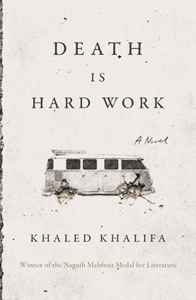 Khaled Khalifa, Death is Hard Work: A Novel, translated from the Arabic by Leri Price (New York: Farrar, Straus and Giroux, 2019), 180pp.
Khaled Khalifa, Death is Hard Work: A Novel, translated from the Arabic by Leri Price (New York: Farrar, Straus and Giroux, 2019), 180pp.
Since the Arab Spring that began in 2011, Syria has become what the former Secretary of State Warren Christopher called, in reference to Bosnia, "a problem from hell." About 500,000 people have died. Over half the population of 22 million people have fled the country or been internally displaced. President Bashar al-Assad has bombed his own country into oblivion. A dozen countries now fight a proxy war there, along with twice that many insurgent militia groups. This Syria is the setting for the fifth novel by Khaled Khalifa (born 1964), who was born in Aleppo and has refused to leave his home in Damascus.
As Abdel Latif lay dying in a Damascus hospital, he made a "last wish" to his youngest son Bolbol — that his body be returned to his ancestral village of Anabiya for burial. In a "rare moment of courage," Bolbol "acted firmly and without fear." He would fulfill his father's request. As the novel unfolds, there are good reasons why Bolbol comes to regret his decision.
Normally it would take only a few hours to travel to Anabiya, but as we know, Syria is now a place of an apocalypse. In case compassion fatigue or the rapid fire news cycles have made us forget about Syria, Khalifa reminds us. It is a place of mass graves. Endless check points where militia of unknown origins act with violent impunity. The dreaded military police that's controlled by the government. Sporadic water, food, and electricity. Streets that are a wasteland. Curfews, snipers, burned out cars, and starvation. The mass exodus of civilians. Morgues so overflowing that families have only a limited time to claim the bodies of their loved ones before they are disposed. The surname or place of birth on your identity card could mean death or "disappearance." And the result of all this human suffering is a failed revolution.
Bolbol's trip is further complicated because he and his two siblings, Hussein and Fatima, haven't even seen each other in four years, and have been deeply estranged for ten years. Their father was also a wanted man for his revolutionary opposition to the regime. And in this land of death, nobody even expected a normal burial anymore: "rites and rituals meant nothing now." Why not bury him wherever it was most convenient? Why risk their own lives on such a fool's errand? As the trip took many days rather than a few hours, the rotting corpse in their minivan becomes a metaphor for the entire country.
Death in Syria, writes Khalifa, has become a "terrifying flood drowning everyone." No one even laments that death no longer provokes outrage. In this sense there is nothing at all special about Abdel's death, or anything deeply human about his request for a proper burial that would and should evoke pity. Death was way too close to everyone, and there were way too many bodies to be shocked by anything. In other words, "the exceptional had become habitual, and tragedies were simply mundane — perhaps that was the worst part about this war."
For more on Syria see my reviews of the three movies Return to Homs (2014), Inside the Islamic State (2014), and The White Helmets (2017).
Dan Clendenin: dan@journeywithjesus.net


